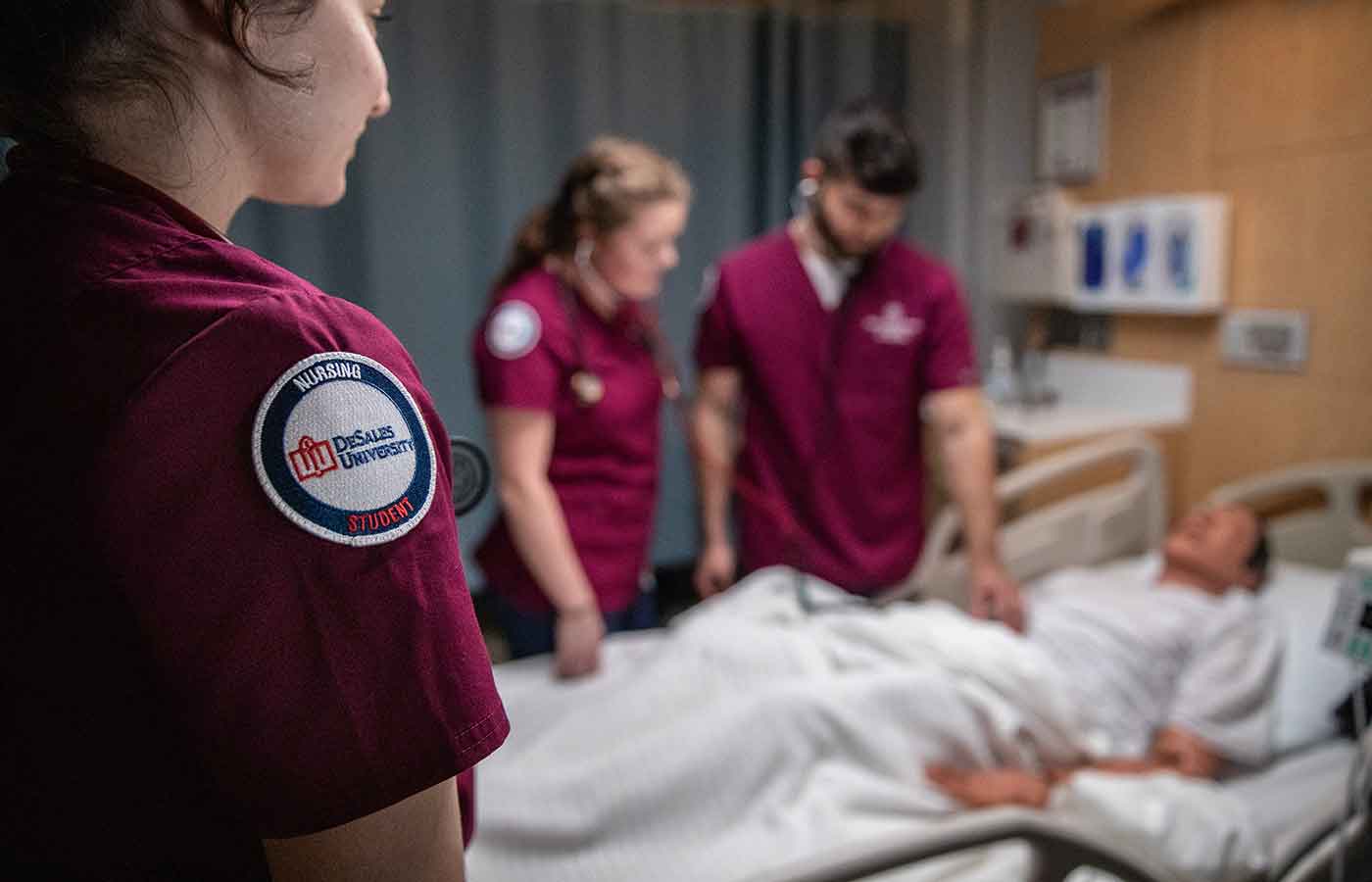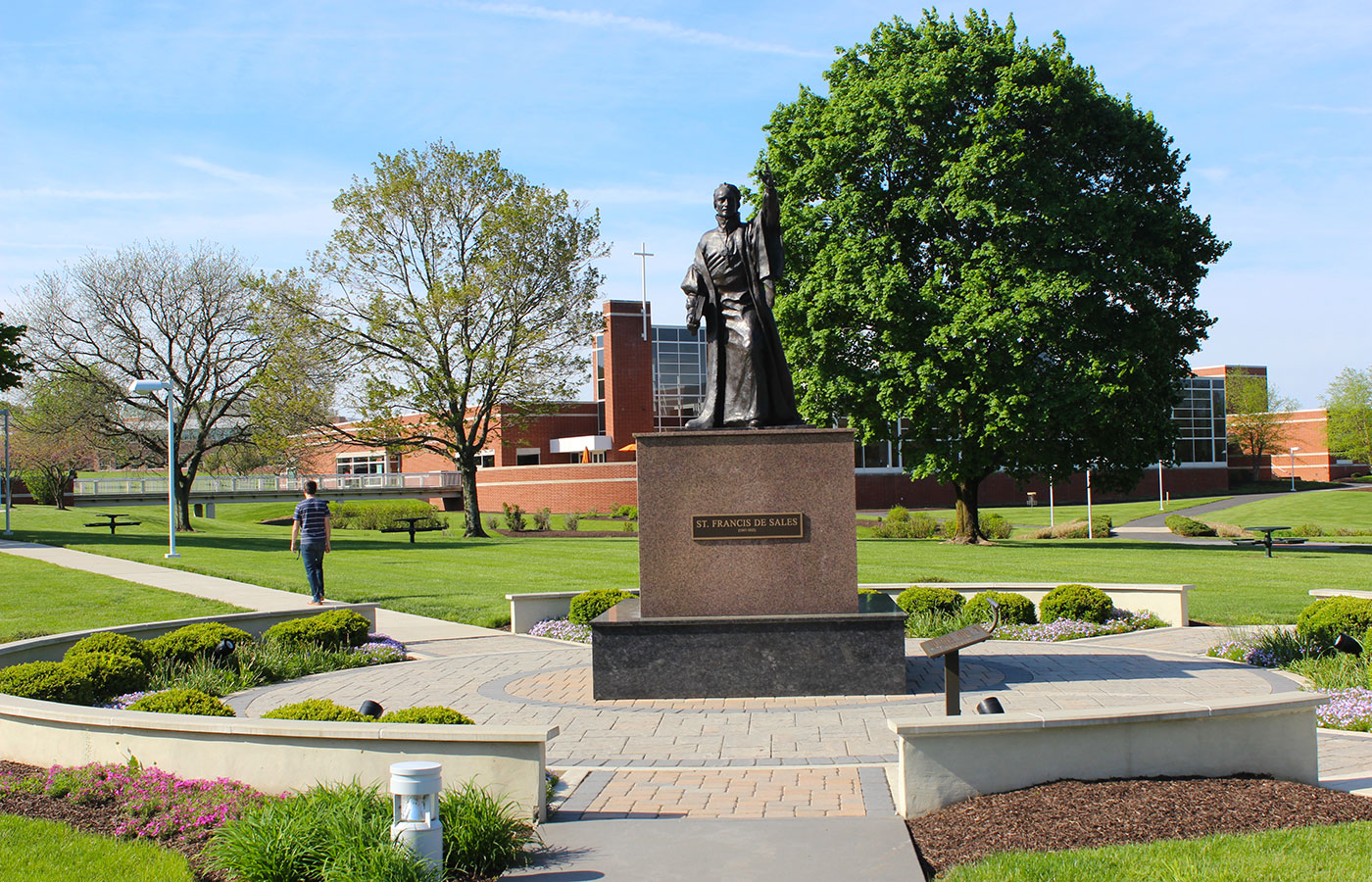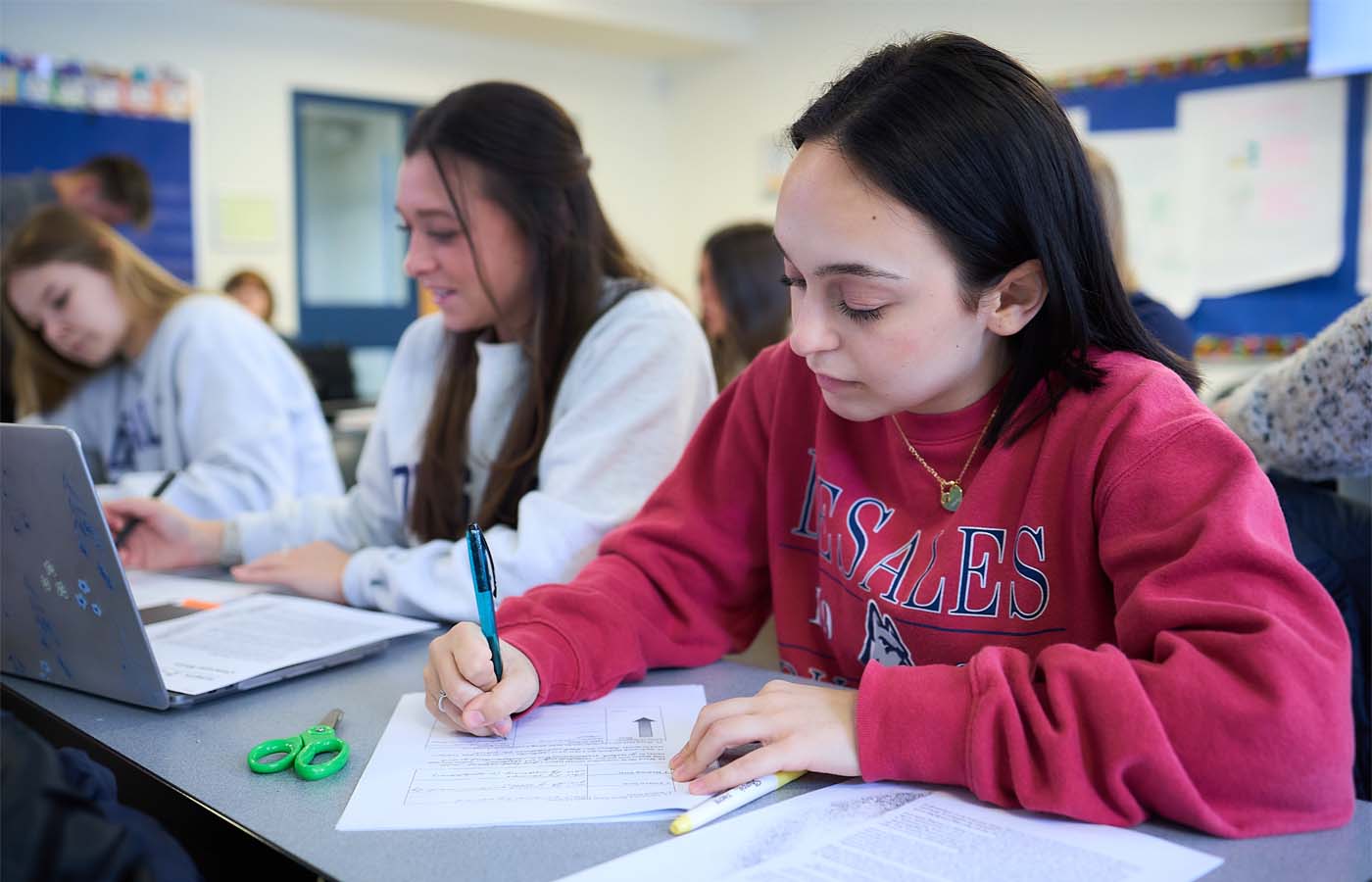School of Nursing
Master of Science in Nursing (MSN) and Nurse Practitioner (NP)
Earn a graduate degree in nursing from DeSales and blend advanced skills and specializations with spiritual principles to deliver compassionate patient care.
Program Details
- Official Degree Name
- Master of Science in Nursing
- Format
-
Online
- Credit Hours
- Varies
- Program Start
- Winter, Spring, Summer, Fall
- Application Deadline
- Dependent on track
- Average Time to Degree
- 2-3 Years
Why Get Your Graduate Nursing Degree at DeSales University?
If you’re aiming for a specialized career in nursing, whether as a nurse practitioner, healthcare executive, advanced clinician, educator, or future in forensics or informatics, the DeSales School of Nursing has the right program for you. As the largest nursing school in the Lehigh Valley, DeSales offers unique experiential learning opportunities backed by a dedicated team of full-time faculty. With a 99.5% certification pass rate, DeSales is the ideal choice for advancing your nursing career.

Program Highlights
Multiple Pathways to Success
- Our Master of Science in Nursing and Nurse Practitioner programs offer a range of pathways with 7 MSN fields of study and 7 certifications. This variety allows you to specialize in different areas of the healthcare industry.
Professional Development Opportunities
- Connect with fellow nursing professionals by obtaining membership in DeSales University's chapter of the Sigma Theta Tau Honor Society or Student Nurses' Association. Utilize advanced learning facilities like our Simulation Lab and the region's only Gross Anatomy/Cadaver Lab to gain hands-on experience in environments that closely mirror real healthcare settings.
Preparation for Specialized Industries
- Pursuing an MSN or nurse practitioner qualification at DeSales means more than a one-size-fits-all approach. Our core MSN curriculum covers essential advanced healthcare concepts while allowing you to focus on specialized areas such as acute care, gerontology, psychiatry, or family medicine.
What Will You Study?
All MSN or NP students must also complete their field of study's designated clinical practicum hours in addition to the required course schedule. See the course catalog for details.
The Master of Science in Nursing degree includes four types of courses: core, advanced core, specialty, and clinical. The specialty and clinical courses will vary based on your chosen concentration, so refer to the course catalog for detailed curriculum information. Learn procedures such as suturing, anesthesia, X-ray interpretation, chest tube placement, central line placement, and EKG interpretation.
Most MSN programs typically include the following core courses:
- Advanced Pharmacology
- Advances Physical Assessment
- Clinical Prevention in Population Health
- Health Informatics, Quality & Safety
- Health Policy, Organization & Financing
- Pathophysiology
- Principles of Epidemiology & Biostatistics
- Advanced Research
School of Nursing
Fields of Study & Degree Options
Swipe below to discover more!

Fields of Study
Learn MoreNurse Practitioner
Adult-Gerontology Acute Care (AGACNP)
Train to diagnose, treat, and manage critical conditions as an AGACNP. Experience hands-on learning at excellent clinical facilities.
Courses You May Take Include:

Nurse Practitioner
Family/Across the Lifespan (FNP)
Become a certified Family Nurse Practitioner. Gain hands-on experience through initiatives like our Standardized Patient Program, preparing you to use your diverse clinical skills in pediatrics, adult health, and gerontology to treat a wide range of conditions.
Courses You May Take Include:

Nurse Practitioner
Psychiatric-Mental Health (PMHNP)
Elevate your career in psychiatry and mental health with our PMHNP program. Gain hands-on experience in renowned clinical facilities with a strong emphasis on patient-centered care and ethical practice. Our comprehensive curriculum prepares you to navigate diverse clinical environments—from pediatrics, to adult, to geriatrics—and excel in the evolving field of mental health.
Courses You May Take Include:

Clinical Nurse Specialist
Adult-Gerontology Acute Care (Adult CNS)
As a Clinical Nurse Specialist (CNS), lead the advancement of evidence-based care in healthcare systems. Focus on both direct and indirect care, ensuring safety and efficiency from individual patients to your entire network.
Courses You May Take Include:

MSN Concentration with Certification
Forensic Nursing with Certification in Investigative Forensics
An MSN in Forensic Nursing equips you with nursing, law, and forensic expertise for roles in healthcare and legal systems. Become a key player in investigative forensic services, and advocate effectively for patients in sensitive situations.
Courses You May Take Include:


Dual Degrees
Learn MoreDual Degree
MSN + MBA: Nursing & Business Administration
Gain expertise in both clinical and business aspects to serve in executive leadership healthcare roles related to operations, clinical services, healthy policy, quality management, and more.
Courses You May Take Include:

Dual Degree
MSN + MSIS: Nursing & Information Systems
Combine an MSN with a Master of Information Systems (MSIS) to prepare for diverse careers in healthcare technology. Learn to evaluate health data analytics, plan process strategies, and lead in healthcare technology services.
Courses You May Take Include:


Nursing Certifications
Learn MoreGraduate Certificate
Nurse Educator Certificate Program
Want to become a nurse educator? With a baccalaureate degree in nursing, complete just three online courses at DeSales to prepare for the Certified Nurse Educator (CNE) Exam. Promote a culture of caring in academic and clinical teaching.
Required Courses Include:

Post-Master's Certification
Adult-Gerontology Clinical Nurse Specialist Certification
Add a Clinical Nurse Specialist Certification to your graduate nursing degree to advance your role in clinical care for adult patients in just one year. Gain skills to deliver reliable acute care in ICUs, trauma centers, specialty clinics, and more.
Program Summary:

Post-Master's Certification
Forensic Nursing with Certification in Investigative Forensics
Broaden your healthcare education into forensics and criminal justice with Certification in Forensic Nursing and Investigative Forensics. If you have a graduate nursing degree, DeSales can guide you to certification in this vital field in as little as two years.
Program Summary:

Post-Master's Certification
Nursing Informatics with MSIS in Data Analytics
Earn a Nursing Informatics Certification with MSIS in Data Analytics within two years. Combine this expertise with your graduate nursing degree to step into high-demand careers in healthcare data administration and technology.
Program Summary:

Post-Master's Certification
Nurse Practitioner Certification (FNP, AGACNP, or PMHNP)
DeSales provides clear pathways to additional nurse practitioner certifications for those with a graduate nursing degree. Achieve your Family (FNP), Adult-Gerontology Acute Care (AGACNP) or Psychiatric-Mental Health (PMHNP) certification in as little as one year.
Program Summary:

Outcomes & Careers
Our Master of Science in Nursing (MSN) program is designed to equip you to meet the complex demands of patients, healthcare consumers, and the modern healthcare system. As you prepare for certifications, you'll integrate nursing science with best practices from medicine, ethics, economics, and public health.
- We are the largest nursing school in the Lehigh Valley, a hub for healthcare leaders and practitioners, and situated near local, award-winning healthcare networks.
- DeSales takes pride in our program's impressive 99.5% graduation pass rate and the tradition of our alumni advancing into roles at major regional healthcare organizations.
- MSN graduates are highly sought after, with most finding positions in their specialization within nine months after completing their studies.
- Approximately 50% of students in DeSales University's Master of Nursing program secure employment before graduation.
- Use the Scholars Network for employment after graduation and receive up to $65,000 in loan repayments.

Admission Requirements
- Baccalaureate degree in nursing from an ACEN or CCNE accredited institution with a cumulative GPA of 3.0 or higher on a 4.0 scale and submission of official transcripts.
- Master of science in nursing degree GPA of 3.0 or higher on a 4.0 scale for post certifications.
- Completed application to DeSales University.
- Evidence of 1-year full-time experience as a practicing RN prior to starting the clinical phase. (Additional track specific experience is required for advanced practice degrees.)
- An active registered nurse license or eligibility for licensure.
- Resume or Curriculum Vitae.
- Graduate Personal Statement.

Accreditations & Student Organizations
Nursing by the Numbers
#48 Best Online Master's in Nursing Programs
- U.S. News & World Report
100% Employment rate within 6 months of graduation
#134 Best Nursing Schools: Master's
- U.S. News & World Report
Program FAQs
The Healthcare Simulation Center is a state-of-the-art training facility where students gain hands-on experience with life-like manikins, standardized patients, and advanced medical equipment. It’s designed to help you build clinical skills and confidence before entering real healthcare settings.
All MSN and Post-Graduate Certificate program tracks require evidence of the equivalent of 12 months of full-time nursing practice. Additional nursing practice experience is required for certain tracks:
- For the AGACNP: Minimum of one year RN experience prior to starting clinicals in an adult acute care/ICU specialty area (i.e. medical/surgical ICU, trauma ICU, neuro/neurosurgical ICU, cardiac ICU, open heart unit, burn unit, intermediate care unit, emergency department, etc.). You will be required to continue to work as an Acute Care/ICU registered nurse to fulfill the one year of nursing practice experience required to progress to the specialty clinical courses.
- For the FNP: Minimum of one year RN experience prior to starting clinicals. If you are a currently practicing nurse who has only had pediatric, labor and delivery, or post-partum experience, you will be required to obtain employment as an RN in the care of the adult while completing the program part-time. You will be required to continue to work as a registered nurse to fulfill the one year of nursing practice experience required to progress to the specialty clinical courses.
- For the PMHNP: Minimum of one year RN experience prior to starting clinicals as a psychiatric nurse. You will be required to continue to work as a psychiatric nurse to fulfill the one year of nursing practice experience required to progress to the specialty clinical courses.
*All other MSN tracks: If you have less than one year of full-time nursing practice, you will be required to continue working as a registered nurse to fulfill the one year of nursing practice experience required to progress to the specialty clinical courses.
*DeSales can provisionally accept students who are in their senior BSN year. These students receive full acceptance once they confer their degree and pass their boards.
Yes, we're working with the Scholars Network to partner with several large healthcare providers in the area. Currently, our partners are offering up to $65,000 loan repayment for a 3-year commitment for our Acute Care Nurse Practitioner students.
To be eligible for any MSN program track, a BSN is required. DeSales University offers three pre-licensure options for obtaining a BSN, including a second-degree Accelerated BSN for applicants who hold a bachelor’s degree in a discipline other than nursing.
DeSales University accepts students from most states, however, applicants outside of Pennsylvania should check with the School of Nursing to confirm eligibility.
DeSales University cannot admit students from the following states at this time: Alabama, Colorado, Louisiana, Missouri, Nebraska, North Dakota, North Carolina, South Dakota, and Wyoming. In addition, residents of New York may be admitted, however, they may not complete clinical preceptorships in the state of New York.
Prospective students should contact the licensing board of their specific state of residence to determine if the program meets state requirements for NP licensure.
Yes! The MSN program will generally accept up to six transfer credits or two courses into the declared MSN track based on the following criteria:
- The coursework must have been completed within five years before admission to the MSN program.
- The courses transferred must be similar in credits, scope and subject matter to those offered in the MSN program. Upon acceptance, you must provide a course syllabus and topical outline for any courses requested for transfer for evaluation by the Chair of Graduate Programs.
- Only courses from an ACEN or CCNE-accredited college or university will be accepted for transfer.
- Your grades for transfer courses must be a B or higher.
No! DeSales University employs a full-time Graduate Clinical Liaison who is responsible for obtaining clinical placements. Clinical preceptors must pass a review of credentials before working with our students. A faculty member visits each clinical site at least once per semester.
Please note: the vast majority of advanced practice program clinical sites are located in Eastern Pennsylvania, with some in New Jersey and surrounding states. Students in any online MSN program at DeSales will be expected to help facilitate obtaining preceptors in their respective states. The Graduate Clinical Liaison works closely with students to assure that the preceptor they have found will be able to provide all clinical experiences necessary.
DeSales MSN tracks and certificates accept applicants year-round, so you can apply at any time and start at your convenience, full or part-time. You can choose from four different start times per year: Winter, Spring, Summer or Fall.
MSN degree applicants are admitted on a rolling basis up until the following deadlines:
- The deadline is June 1 for a July (Summer semester) start
- The deadline is July 1 for an August (Fall semester) start
- The deadline is December 1 for a January (Winter semester) start
- The deadline is March 1 for an April (Spring semester) start
Technical support, library access, and other support services are critical to a quality education at the graduate level.
DeSales University provides extensive library, instructional technology, computing, and information technology resources and services, both on campus and remotely. The University Center for Educational Resources and Technology (CERT) offers a variety of supportive resources for students in online courses.
DeSales University boasts a 99.5% pass rate for all nurse practitioner programs since 1999.
Simulation is widely recognized as a means to reduce future errors, foster interdisciplinary practice, and contribute to a quality education. DeSales University has the premier health care simulation facilities in the region, using both hi-fidelity human patient simulators and standardized patients, as well as the only human anatomy (cadaver) lab in the region.
DeSales University advanced practice faculty are all credentialed and certified in their advanced practice specialty, and 90% possess the doctoral degree.
Our advanced practice faculty are clinically active in outpatient, community, clinic, skilled nursing facilities and hospital sites.
For applicants who do not meet the minimum GPA requirement of 3.0, completion of the GRE or MAT will be required to be considered for admission to the program.
- You can register for a GRE test date by visiting gre.org.
- You can register for an MAT test date by visiting pearsonassessments.com.
Since we believe that verbal and written communication is a vital part of taking care of patients, we require the TOEFL test for any applicant, regardless of citizenship, for whom English is a second language. MSN applicants must have a total score of 104, with a minimum of 26 in all subscales on the internet-based test. Exams must have been taken within two years of application to a DeSales program.
International applicants must contact Leslie Bartholomew, Designated School Official, at 610-282-1100, ext. 1859 or Leslie.Bartholomew@desales.edu to inquire about international admission requirements
DeSales University's School Code: 002021
Application documents can be uploaded via your application portal. A link to your page will be emailed upon submission of your application form. Official transcripts and foreign evaluations can be sent to the below.
Electronic transcripts can be sent to gradadmissions@desales.edu
- Paper transcripts can be mailed to:
DeSales University Admissions Office
ATTN: Graduate Programs
2755 Station Ave.,
Center Valley, PA 18034 - All transcripts from any degree-granting institution outside the United States must be evaluated by a NACES approved evaluation service, such as World Education Services, Inc., with the resulting report submitted directly to the address above. Please visit naces.org for additional information. DeSales University's institutional reporting code is 002021.
Our events calendar houses all our academic calendar. Simply use the Academic Calendar and Semester filters to see important upcoming dates.
Of course! Any questions regarding the MSN program may be directed to the Graduate Nursing Admissions Office at gradadmissions@desales.edu.
Recent News


Master of Science in Nursing
Contact
-
610-282-1100 x1271 -
msn@desales.edu -
Gambet Center









